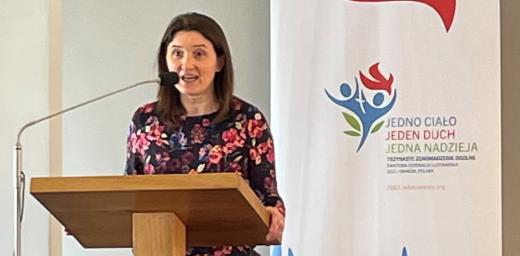Sowing seeds of hope in soil of online conversation

Photo: LWF/Albin Hillert
Webinar explores ways of countering hate speech and promoting inclusion, justice, respect on social media
(LWI) - Churches have a responsibility to educate, equip and engage on social media to promote a culture of respect, counter hate speech and sow seeds of hope. That was the message from panelists at a webinar entitled ‘Hope Speech not Hate Speech: addressing hostility and overcoming divisiveness in the public space’. The 26 May event was jointly organized by the Lutheran World Federation (LWF), the World Association of Christian Communication (WACC) and the Evangelical Church of the Lutheran Confession in Brazil (IECLB).
In opening remarks, the Evangelical Lutheran Church in America (ELCA) senior director of strategic communications, Jocelyn Fuller, revealed how a rapid growth in her church’s social media presence is reflected by a sharp rise in online hate speech. Divisive and exclusionary language, she noted, reflects a polarized and divided nation in the United States today.
ELCA’s communications team works hard to counter that language, she said by “nurturing respectful dialogue” and by “creating spaces for hope,” a task which took on sudden urgency with the outbreak of the COVID-19 pandemic. Presiding Bishop Elizabeth Eaton’s weekly messages providing prayer, inspiring stories and reflections on current events have been a vital part of that strategy, reaching wide audiences through the various social media platforms.
Rebuild respectful conversation
WACC General Secretary Philip Lee highlighted how online hate speech is merely the most recent tool used by those seeking to spread divisive political ideologies. He cited earlier examples of the government-owned radio station in Rwanda that fueled the 1994 genocide and a book entitled Reel Bad Arabs, which explores the impact of a century’s worth of films portraying Arab characters as villains. The solution, he continued, lies in seeking to “rebuild conversation” through all social media platforms and “to promote diversity and respect online.”
Speaking as a linguist, Klára Balicza, coordinator at the department for ecumenical and foreign relations of the Evangelical Lutheran Church in Hungary, reflected on the intentions of those using hateful words and the effects they have on those hearing or reading them. Intentions may be an unconscious expression of fear and frustration, she said, or they may be “conscious attempts to threaten and silence” others.
The church cannot offer “foolproof solutions”, she continued, but we can offer God’s word, as a “living and active” word which is meant “to create, to heal, to forgive sins, to bring back to life, to bring down walls, to free from chains, to finish what is needed for our salvation.” She cited the decision, a decade ago, by Lutheran, Reformed, Greek Catholic and Roman Catholic churches in Hungary, to create a network of Christian Roma colleges, as a practical way of countering prejudice, while supporting education and integration of disadvantaged Roma communities.
Media education is essential
Renato Valenga, a journalist and youth leader with the IECLB, spoke of the way social media was manipulated during the most recent elections in his country “to attack and undermine candidates and their political agenda.” The task of challenging hate speech and misinformation online is a “complex and challenging assignment,” he stressed, but it is a “call to action for all of us” of whatever age group, religion or political persuasion.
Noting that online hate speech mostly targets black and indigenous people, women and members of the LGBT community, Valenga highlighted the need for much stronger media literacy education. He said it is vital to raise awareness about the impact of hate speech on individuals and communities, to understand the deliberate blurring of lines between news and opinions and to teach people to avoid “hasty responses” to social media posts.
Reframe online conversations by reinforcing core values that promote a just society, an inclusive public space, a commitment to truth and non-violence in our interactions.
In closing comments, LWF’s head of communications, Rev. Arni Danielsson spoke of the need to “reframe” online conversations by reinforcing core values that promote “a just society, an inclusive public space, a commitment to truth and non-violence in our interactions.” While exposing the way that hate speech undermines these values and “peddles in lies,” he said solutions lie in gathering people “around a public space that is open and inviting and equal.”
“As churches, as people of faith, as online citizens,” Danielsson added, we should strive to "change the soil, to influence the context” of online conversations. Hope speech can be nurtured, he concluded, by framing messages of justice, inclusion and respect for diversity, inviting others “to associate with hope and express themselves with hope in their online communication.”
LWF/P. Hitchen





